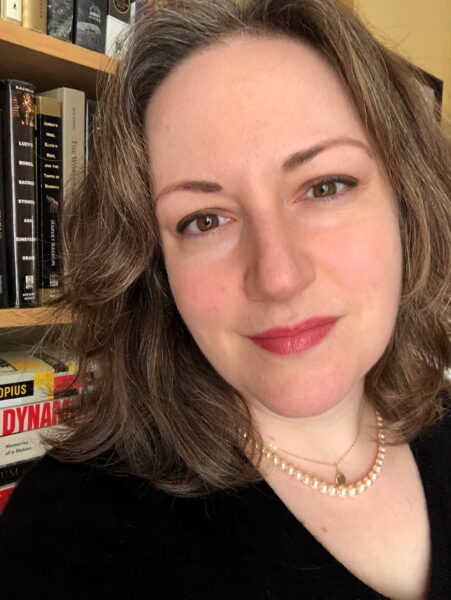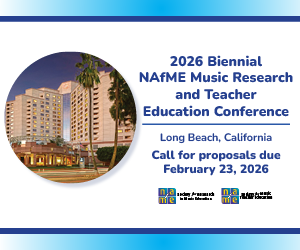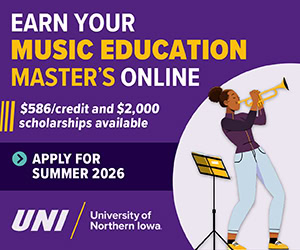/ News Posts / The Invaluable Role of Music Educators in the Education Profession
The Invaluable Role of Music Educators in the Education Profession
Remember Your Why
By NAfME Member Elizabeth Rusch Fetters
When it feels like every day brings a new attack on educators and music education, turn to these talking points and tips.
- You are the professional. You went to school for years and practiced your instrument so that you could be an artist who teaches.
- We are experts in our field. Most teachers have advanced degrees. It’s okay to speak with authority on the subject in which you are the expert: teaching students music.
- We are eternally teachers, in and out of the classroom. Take the opportunity to educate parents, students, community members, and administrators about what we do.
I teach middle school, and I love the developmental phase that middle schoolers are in—so I tell everyone. The conversation usually goes like this:
“What grade do you teach?”
“I have middle school.”
“Middle school? Ugh! I hated middle school!”
“Oh, no! It’s great, because you see, early adolescence is the second growth spurt in human development . . . ,” and I’m off.
I educate people about the brain and about human development. I tell people what’s going on developmentally for our adolescents. Never pass up the opportunity to explain why what we do is so important for our kids. For whatever grade you teach, you know this age group. Educate others.
Music is a safe space for kids.
This is another topic that I’ll talk to anyone about. Parents, community members, other teachers, and our administrators need to know the service that we provide for our students.
Recently, my principal asked us to be ready to talk about how our program aligns with the district-wide strategic plan. I told her that the music department can’t assist with hiring highly effective staff or ensure that school bus drivers are licensed professionals. But, what we can do as music educators is get kids in the door. Since the pandemic, chronic absenteeism remains 75% higher than before the pandemic. We know as music educators that for many students music is the only place that they feel safe and seen all day long. That’s powerful. Students are stressed in their other classes by the pressure of grades, tests, making the honor roll, or advanced placement. Music may very well be the one place where the student can relax, be themselves, and express themselves. If we are the reason that students come to school, then we are the single most valuable part of that student’s academic life—because we got them in the door of the school.
As teachers we know that kids need to be in school. We need to make that clear to our administrators and community through our words, yes, but also through how we treat our students in our classroom. It depends on your comfort level with your students, but I include my students in this lofty task. I tell them that I know music might be the only safe space all day and that no one in here is going to ruin that for another student. It’s a theme I return to when my chorus class needs a reset on classroom expectations. I ask students to hold me accountable. Music is where we love everyone for who they are and where they are, and everyone is welcome. A safe space where students can learn is the foundation for all learning. Highlight that for your administration in your observation conferences.
We are in the business of education.
Education means teaching our students how to think. We are not in the business of propaganda. Propaganda is telling people what to think. I am always surprised at the number of times I have to explain this concept. Stop people on the street! Work it into conversation! The moment someone starts with complaints about the American education system, I launch it. “Well, I understand you’re frustrated with our education system, and it’s not perfect,” I share. “However, we are in the business of education. Education means teaching people how to think.”
When you’re being questioned about music selection or concert programming, remember that you are the expert. You’ve selected music that is appropriate for your students’ ages and development. You know who your community is and where the students are. What might be appropriate for my suburban students might be wildly inappropriate for your rural students. You meet the needs of all learners. You build on previous learning.
Have these phrases at the ready when you are questioned about music selection. I often have a statement on music with sacred text handy. If you are teaching chorus, it is a useful tool to hand to a parent who has a question about music with sacred text . . . or even text they do not agree with. I often remind students that we are allowed to sing music with sacred text in school. What I am not allowed to do is to tell them what to believe. (See the previous paragraph on education, not propaganda.)
Sing the praises of your music program.
Isn’t it wonderful that we have so many students in our music program that we have to pull other teachers out of the classroom in order to attend our performance field trips? Start every sentence with, “We have a long tradition of musical excellence here at . . . ” Never miss an opportunity to blow your own horn. Remember, no one else is going to do it for you. I am not suggesting we be obnoxious about it, but our school community and administration need to know the good things we do in the music department. We are expected to put on a public performance twice a year. No one sees the math class up on stage performing twice a year.
We are the public face of our school community. Make the most of it. Invite school board members to your concerts. I will forward wonderful emails from parents to my administration. If I have an especially neat lesson that I am excited about, I invite the administration to see it. If we are in the midst of the drumming unit in general music, I will invite the administration down. Who doesn’t like to sit for a few minutes and bang on an overturned Home Depot bucket with mismatched drum sticks? If I hear that the superintendent is going to be on campus, I will invite the entourage down to see what we are doing in the music department. Everyone likes to hear a little music; it’s good PR for the music department; and you may very well have just gotten your administration out of a bind with a surprise superintendent visit.
Remind people that in the music department we are an academic, graded course.
It is important for administrators and other teachers to know that, although we might not have yearly standardized tests, we do have a curriculum, National Fine Arts Standards, and grading rubrics that we use just like every other content area. When my assistant principal said to me, “I can’t have you pull a teacher from the classroom for your chorus field trip,” I responded, “I’m a classroom teacher.” Do not let yourself be put into the “specials” box or the “other subjects” box. It’s the same reason that we bristle when the music emojis are in the “activities” or “hobbies” section of our phones, right? We are not an activity or a hobby. Music education is a critical component of preparing the whole student, and our classes are academically weighed the same as all other classes.
Hopefully these little thoughts and catch phrases will help you as you continue to advocate for your program and your students. Best wishes for a great school year!
About the author:
 NAfME member Elizabeth Rusch Fetters holds degrees from Indiana University of Pennsylvania, Kent State University (Ohio), and the University of Maryland. She just celebrated 20 years of service to Harford County Public Schools in Maryland and is entering her 25th year of teaching. She teaches middle school general music and chorus. Her private bassoon students consistently win seats in area honors ensembles, the Baltimore Symphony Youth Orchestra, and earn excellent and superior ratings at festival. When she is not advocating for her program or making reeds, Fetters sponsors the chess club at her school and enjoys reading a good book.
NAfME member Elizabeth Rusch Fetters holds degrees from Indiana University of Pennsylvania, Kent State University (Ohio), and the University of Maryland. She just celebrated 20 years of service to Harford County Public Schools in Maryland and is entering her 25th year of teaching. She teaches middle school general music and chorus. Her private bassoon students consistently win seats in area honors ensembles, the Baltimore Symphony Youth Orchestra, and earn excellent and superior ratings at festival. When she is not advocating for her program or making reeds, Fetters sponsors the chess club at her school and enjoys reading a good book.
Did this blog spur new ideas for your music program? Share them on Connect! Interested in reprinting this article? Please review the reprint guidelines.
The National Association for Music Education (NAfME) provides a number of forums for the sharing of information and opinion, including blogs and postings on our website, articles and columns in our magazines and journals, and postings to our Connect member portal. Unless specifically noted, the views expressed in these media do not necessarily represent the policy or views of the Association, its officers, or its employees.
Published Date
September 9, 2025
Category
- Careers
- Music Education Profession
Copyright
September 9, 2025. © National Association for Music Education (NAfME.org)






